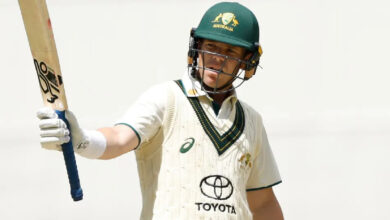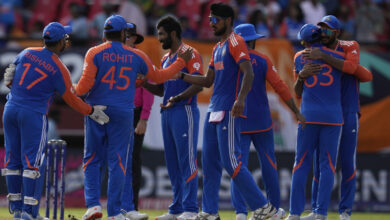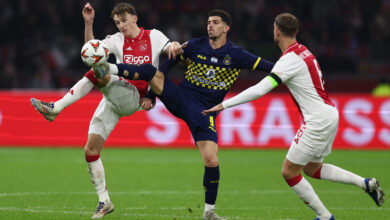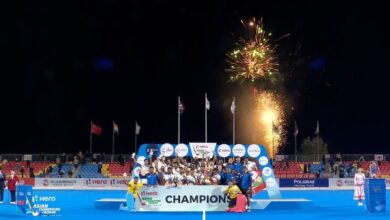Long Read: Of sticks, and stones

Vandana Katariya remembers a viral infection from what seems like a lifetime ago now, that the rest of the world remained oblivious to, but which had brought her universe crashing down. Imagine a personal pandemic that plays havoc with your body and mind for long lengths of time.
It started with a fever sometime around 2009, when she was on the brink of making the senior women’s hockey team as a 17-year-old. It weakened her so much, and sent her into such an anguished spiral that her voice crackles on a perfectly clear phone connection, while reliving those next two years, as she says, “Bas socha life khatm kar du. Woh tak time aa gayaa tha.” She considered ending her life in the direst of career slumps.
It’s a memory that Katariya’s overjoyed last six months — with a hat-trick at the Olympics, an inspiring 4th place finish for India’s glorious women’s team and her recent Padma Shri conferring, can’t quite make up for. Young athletes are known to get into self-punishing modes while grappling with uncontrollables of sport. For one of Indian hockey’s most inspiring players of all time, it’s a somber totem that defines her very relationship with hockey, making on-field challenges look like a dribble-in-the-park in comparison.
The team had returned from a good Junior hockey World Cup in Boston where India beat Australia colts in a group game, but Katariya stayed on the periphery. On her return, the bout of viral dragged her down, and she found herself out of the seniors scene, virtually alone at her Lucknow sports hostel, even as others chirpily packed their bags to travel to Gwalior for a national camp. “The only option staring back at me was going home because I had completed 5-6 years at the academy and then everyone graduates. The environment wasn’t good at all back home in Haridwar, and I thought my hockey was finished,” she recalls.
Katariya had defied stilted neighbourhood equations when she got picked for Lucknow. “The village scene was very different and many people had no sense. Backward people would taunt my family about me being a girl and being sent out to another city to play hockey. They’d say, ladki hai, aakhir banaani roti hi hai. But I had reached Lucknow, put in years of training. Now with no options for trials, I would be forced to go back home,” she recalls. Go back defeated. It sent her down some pretty dark alleys, till another opportunity appeared ahead of the 2012 Olympic qualifiers.
Vandana Katariya became the first Indian women’s player to score hat-trick at an Olympics in Tokyo. (Instagram/Vandana Katariya)
Failing to meet her own expectations — echoed in throwaway taunts that she’d heard since her childhood even when there was no whiff of failure around – drove her to the brink. It wickedly entrenched another unconnected yet visceral demon in her mind, which ironically yanked her out of the corner, throwing wild punches.
While out of the camp, she became acutely aware of what she saw as an inadequacy in her physically. Broken minds can turn hellish in a teenaged brain, but nothing can make you feel little, like a panting shuttle run. “Camp se baahar thi toh lagaa mujhme koi kami hai. (I felt I had drawbacks). Strength-wise, running-wise, in hockey, in everything,” she remembers.
She would land up at the Gopal Hockey Academy in Kurali, Punjab, training under Subhaychand Sharma, and began a fervent attempt at getting back into reckoning. “I started running a lot and especially under the hot noon sun. I would get up at any time and start training, in the gym, on the ground. Even at Lucknow I would run away to the hostel at halftime from school, sneak out balls from the cupboard, and sit under the bed, practising reverse dribble and controlling, so that no one spotted me. I’d train with the boys. They started off saying ‘yeh paagal hai’, but I said ‘koi baat nahi‘ and eventually just got down to practising.”
It was also the time when she simultaneously took to gobbling sweets with a vengeance. “I would eat many sweets because I was out of the camp. I even looked ‘healthy’. It took me time to realise all my hard work amounted to nought if I kept stuffing myself with sweets. Apne aap, I stopped,” she remembers. Vandana Katariya had carefully chosen a team sport because she liked the camaraderie, and the collective struggle. (Indtagram/Vandana Katariya) 2013, she was back in Indian contention, netting 5 goals for India at the Junior World Cup, and her father Nahar Singh’s stoic resilience in the face of nastiness suffered from the neighbourhood, had yielded success. “Actually, he would always welcome me at the station as if I was a celebrity. Whether I was heading back from a good India tour, or simply back on vacation. He should’ve been around now, at this time, and able to enjoy my success and respect and adoration I got after Tokyo. But sadly he passed away just before the Games,” she says sadly.
Sport-loving dad
Nagar worked as a master technician at Bharat Heavy Electrical Limited – often putting in double shifts while also tending to the home’s much-loved cattle. “The struggle was physical, and relentless. First, he’d milk the cows and buffaloes, then go for his work, do overtime. But he still found time to build a makeshift cement jumana gym in front of the house because he loved wrestling,” Katariya recalls.
She had briefly dreamt of studying with others at Navodaya Vidyalaya and ending up with a “good job” from academics. “I wanted to learn with them, and my parents were happy with either,” she says. But the hockey patterns drew her in.
She played kho-kho for two years, while elder ser Reena was enrolled into hockey, and her brothers into football and taekwondo. “Haridwar didn’t have a hockey team back then. So I did athletics, football and kho kho. But when I picked the stick, bhaiyya log around me said I dribble beautifully. That stuck in the mind. So normally most beginners just roll it straight. I zig-zagged and it impressed people. In six months I was picked for the Lucknow hostel. I was also obsessed with perfecting every technique. I’d watch for hours, and then practise equally long,” she says.
It’s at that point that taunting had begun within the family’s earshot. “Maahaul kharaab hota tha,” she recalls. Katariya’s family suffered a slew of caste slurs when India lost early games at Tokyo. It was a bizarre, ignorant and vile contention that “India has lost because there were too many Dalit players.”
“It’s not something I want to talk about. My family always shielded me from it and took great pains to ensure they never shared what was said with me. It’s something I don’t understand why it happens. In my father’s eyes, I was a hockey star. But what I remember is how he never reacted to it. He would personally drop me off at practice and bring me back home. He never answered them back. But he always believed, ek na ek din, unhi ke ghar se badhai aayegi to celebrate me. I’m happy he was proven right,” she says vindicated.
Katariya had carefully chosen a team sport because she liked the camaraderie, and the collective struggle. It’s not uncommon to watch her fan out passes across the field speedily and unselfishly, and her defensive work rate has remained impressive. She believes the Padma honour is thanks to the team and belongs to every teammate.
“See, there’s a team behind the team — of coaches, physios, cooks, doctors. Nothing is individual in hockey. We learnt about playing for each other from ‘mindfullness’ sessions,” she stresses. Being cloered during the pandemic for a year and a half at Bangalore’s SAI Centre, the team was smelted, drawing the best out of their individual strifes — though from the outside it looked uncomfortably confining on the players.
“We’d spend hours talking hockey in the rooms at SAI, and when we got a chance, we’d train on the ground. Through Incheon Asian Games (2014) bronze, and then playing the big teams at Olympics in 2016, then 2018 Asiad, it’s been drilled into us that you run hard on the field for the team. You drop dead tired together and those tough moments keep you together when you are short on inspiration. It’s why we learn ‘galti se mat daro.’ Don’t be afraid of making makes, because the whole team absorbs pressure together. There’s no best friend, it’s always the whole team,” she says rousingly.
It’s why when Vandana Katariya scored a hat-trick in the 4-3 win against South Africa at Tokyo, all she recalls of that magnificent day is how her 3 strikes helped India start their campaign with a win.
The storm would hit soon after.
Unforgettable week
Right after the ‘trick fetched up and a 1-0 edging out of Ireland, India would slump to defeats against Great Britain, Germany and The Netherlands. A nightmarish few days when all talk of team-bonding could easily fray at taut edges, though Katariya felt herself oddly feeling as desperately driven as when she was out of the national camp, paralysed uncertainty and prospect of going home feeling empty, while at the Lucknow hostel.
“After we lost to England, we had a very long meeting for 2-3 hours where the coach was very angry. Things were fast slipping out of our hands, and the feeling was sab kuchh khatm ho gayaa. Thing is we had been very ready for this Olympics, but after losing to Holland, it was like all efforts meant nothing. It’s as if we gave up, and there was too much negativity and some cried.”
This was the same time when the viciousness and scapegoating on the basis of caste began at Haridwar. Vandana would be shielded from all news and social media fallout, the team this time. The evening after the GB game, the team was summoned for a shorter meeting.
“We were shown a 25-minute film about a Japanese gymnast who loved the sport, couldn’t live without it, but suffered an accident, and was told he would never be able to complete his routine again. He defied all that, took treatment and came back,” she recalls. “It was about having no option but to fight back.”
While inspired the gymnast’s tale, her own thoughts though drifted to altogether differently dressing happening from her own teens. “My family treats its cows and buffaloes and even strays like members of the house. I remember a time when I needed Rs 400 to travel for a tournament, and they didn’t have the money. It’s when they sold a newborn calf to a rich dairy. It broke their heart, but they never told me. I knew it had affected them emotionally very badly. I knew that day that I have to put in everything to play for my family, for society, for the country,” she says. “I’ve been told a hundred times to quit so many people.”
Pitted against group-toppers Australia, India were staring at an unscaleable wall. “But we like playing against good teams like Australia. It’s good hockey. In our hearts, all we thought was we just have to win even if our legs are broken. We were losers (last placed) against toppers, but there was no way we were going to lose that match,” she says. In the end, it played out as a poised, sophicated defensive 1-0 masterclass. “Happiest moment. But we just celebrated a little and then focussed on the semifinal (vs GB, India lost valiantly 4-3).”
“It was good to hear some praise us for the first time,” she says cryptically.
Katariya had often travelled on trains back home to Haridwar, mingling with co-passengers who would realise at the station with its brass-band welcome, that they had a star in their midst. This time, not many around stayed immune to being star-struck.
Most perfect shoes
Her footprint in hockey is legendary, but there’s nothing that makes Vandana Katariya go weak in the knees than a nice pair of shoes. Trainers, flats, pumps, heels, ballerinas, Katariya can’t res a shoe store in a mall, and her teammates expect a diversion whenever the lightning-quick all-rounder halts one place for a size-trial.
“I have lots of shoes. I want lots of shoes,” she says, giggling about her love for shopping. Having to play in track lowers all her teen life in her village, she’s happy she opened up the idea of progressive game-wear for younger girls. “But in my house, my mother and sers know it’ll be shoes and more shoes.”
She loves her Punjabi pop music, though it’s the textured Rahat Fateh Ali Khan, whose voice she has always found solace in since her early years.
The sweet intake remains controlled, and she enjoys the savoury aaloo-tamaatar curry her mother rustles up. Not quite addicted to the phone, Katariya found herself overwhelmed after hundreds of messages flooded her phone post the Padma. “I just handed my phone to my teammate Sushila Chanu, and told her, ‘you tell me what to reply!’ But it was a nice surprise,” she says. A few even from an erstwhile hostile neighbourhood. But Nahar Singh had told his daughter, this day would arrive.







